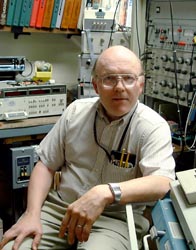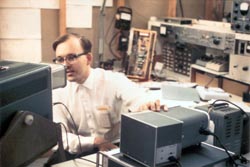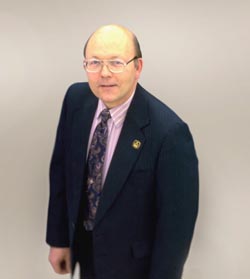A Quick Study

Gerald Stanley has employed a full complement of tools and skills throughout his 40-year career at Crown International. He continues to influence the evolution of an industry, having worked within three generations of audio amplifier design.SCN: Rather than "reading the manual" as a child in the age of radio sets, you opted to take apart real short-wave radios and rebuilt them as conglomerates of their best parts. How did this curiosity affect your career choice?
Gerald Stanley: I found that it was fun to attempt to get inside the minds of the engineers who had designed the original products to answer myriad "why did you do it this way?" questions. It was obvious that if it was fun to struggle with matters of design post facto, it would be the most fun to be the first one to struggle with the creative problem solving.
SCN: As a high school student, you designed and built multi-loop high-feed back tube audio power amplifiers. What is the next generation of engineers building in high school?

- I've heard some aging individuals expressing worry that so much is known that only "big science" remains as fields for discovery. While it's true that some fields have been plowed multiple times, it should be evident that with each new tilling comes another crop that is better than the one before it. Today we are able to discover and manage more complex systems than ever with computers to simulate and optimize our every effort.
- When I was a kid all I had for numeric analysis was a slide rule and that limited the complexity of the problems that I could attempt to solve. Today even kids can model systems that are more complex than the ones that were commercial decades ago. The tools with which we till enhance our ability to understand our world. The younger generation has never had it better. Cheap computing has already changed the world of opportunity. Every future engineer is creatively using their computer to do more than play pre-contrived games.
- As to what future engineers are building, it could be most anything that is within reach of their tools.
SCN: Your 40-year career at Crown has generated more than 32 U.S. patents and spanned three generations of audio amplifier design-vacuum tube, bipolar solid-state, to present-day switch-mode technology. What's the best way to recognize a paradigm shift (if you're not engineering it yourself)?
GS: Paradigm shifts are most easily recognized from within a discipline as being something that would have been resisted or impossible in a previous generation. Engineers should always learn why things are presently done as they are. When the basis reasons change, opportunities for a paradigm shift arise.

GS: Computing tools and measurements fully complement each other. If computer models are to be useful they must predict reality as measured. When what we measure is identical to what we predict we have a chance at having a manufacturable product whose nuances are fully understood and controlled.
The natural growth of technology is to push the complexity boundary to the limits of the tools. At that boundary we must always measure and verify our predictions.
A daily selection of the top stories for AV integrators, resellers and consultants. Sign up below.
SCN: How would you finish the following sentences?
Maintaining a sense of curiosity leads to... endless creative fun. Smugness and senility are bedfellows.
The power amplifier segment of the audio electronics chain will... become more embedded for many applications and will continue to grow in intelligence, power, efficiency, and value.
